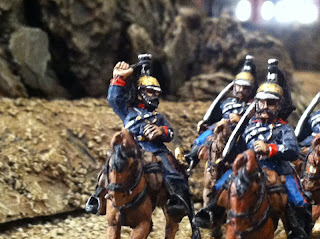Recently on the Colonial Wars Yahoo Group there has been some discussion of 25mm-28mm figures available to model the Afghan regular army of the Second Afghan War (1878-1880) era.
As someone with close to a lifelong interest in the subject, I couldn't help but get involved in the conversation, mostly to describe the Afghan regular army figures contained in the old Wargames Foundry North-West Frontier range, designed by Alan and Michael Perry, back in the early-to-mid '90s.
During the course of this conversation, I made a made a big mistake in my description of the Guard cavalry figures, which said mistake I was luckily able to correct thanks to someone else who knew better saying it just didn't sound right. I'm very grateful he pointed out my error, because if he hadn't, I probably would never have realized it, and my incorrect description would have been stuck there on the web forever, which would be kind of embarassing!
Now I've decided to turn my mistake into something slightly positive, by taking some decent pics of the figures in question and posting them here...
There are 2 Guard Cavalry figures, and they are 2 of my favorites from the range -- a TROOPER holding his saber at rest (NWFCav72), and an OFFICER with his right arm upraised (NWFCav71).
Both figures wear old East India Company brass helmets, with horsehair plumes. I believe they are at least partially based on a description by Lord Roberts of a detachment of Afghan cavalry he saw in 1879, while seeing Major Cavagnari and his escort of Guides off on their way to found the new British embassy in kabul:
"Early next morning the Sirdar, who had been deputed by the Amir to receive the Mission, came into camp, and soon we all started for the top of the pass. We had gone about a mile, when we were joined by an escort of Afghan Cavalry, dressed something like British Dragoons, with the exception of their head-gear, which consisted of the discarded helmets of the old Bengal Horse Artillery. They were mounted on small, useful-looking horses, and were armed with smooth-bore carbines and tulwars (Native swords)."
Here's some pics...
If I have time I will attempt to take some more pics of the various Afghan regular army units in my collection. There are a lot of pics of them in action at various refights of Maiwand, spread throughout the many posts on this blog, but they are not at all easy to locate by subject, so it might be worth the time.






Great looking unit, would like to see the rest of the unit over th course of time.
ReplyDeleteThey do look like French dragoons. What are the differences in uniforms and horse furniture, and could Franco-Prussian French dragoons serve?
ReplyDeleteThank for your comment, Silver Whistle.
ReplyDeleteI've been watching in awe as your Isandlwanda supply and baggage elements have been growing like very beautiful weeds! I am a bit jealous, and need to something similar with Afghan ground-cover below canvas-draped stacks of ammo boxes and other supplies!
Hi, Rob,
You'd have to remove the French Dragoon epaulettes, but other than that... I think they would do pretty well in a pinch, so to speak, so long as the French Dragoon horses are not ornately furnished. In the handful of newspaper illustrations I've seen of Afghan regular cavalrymen, their horse furniture looks pretty simple.
I believe there is some difference in the exact shape of the French c.1870 dragoon helmet and the Bengal Horse Artillery helmet of the 1840s and 1850s, but it's not much of a difference.
In fact, the reason I made that big mistake when first describing the Afghan Guard cavalry rigures, is I was thinking of a pair of Franco-Prussian War French Cuirassier officers, who I had converted to serve as Afghan regular army staff, ostensibly dressed in slightly fancier versions of the uniform worn by the unit pictured above.
In general I believe there is a bit of a "Franco-Prussian War" look to the uniforms of some Afghan regular army troops from the war of 1878-1880, specifically these helmeted Guard cavalrymen, and the regular artillery, with these particular cavalry looking -- as you point out -- something like French dragoons, and the gunners looking something like Prussian artillery crewmen, the only difference there being that some Afghan artillerymen wore a peaked forage cap, and those who did wear helmets, had a more noticeably different style from the Prussians.
I have collected a large number of Foundry 1870 Prussian artillery limbers with crews, which are the last big conversion project I need to do in order to be "done" with my 1878-1880 Afghan regular army. The Prussian limber crews were sculpted by the same Perry brothers who sculpted the Afghan artillery figures, so they make for relatively smooth head-swap conversions, using Afghan gunner heads and Prussian limber crew bodies. Each limber has a crew of 5 -- 3 mounted, 2 seated -- each battery has 3 guns, and for scaled-down use at Maiwand I raised 4 batteries, for a grand total of 12 guns. With 5 crew for each limber, that means doing 60 head-swap conversions.
Even for someone as dedicated and myopic as me, it's a tall order!
The good news is, if you do use French Dragoons as Afghan Guard cavalry troopers, all you'll have to do is clip off those epaulettes, there will be no head-swaps needed.
Those look good hope you get time to post more pics of your collection!
ReplyDelete